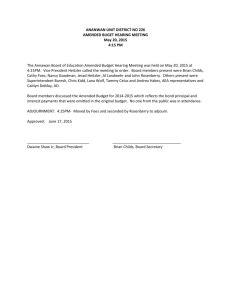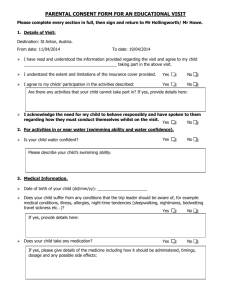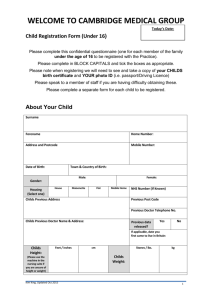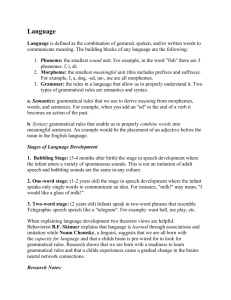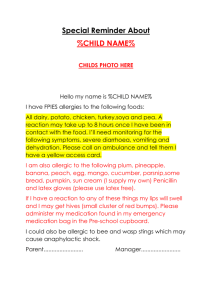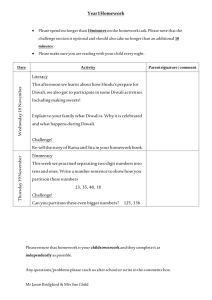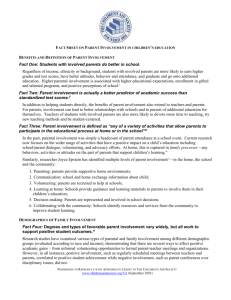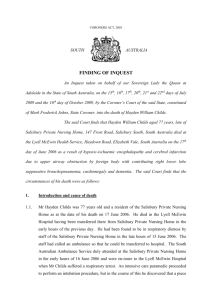Example School Healthcare Plan
advertisement
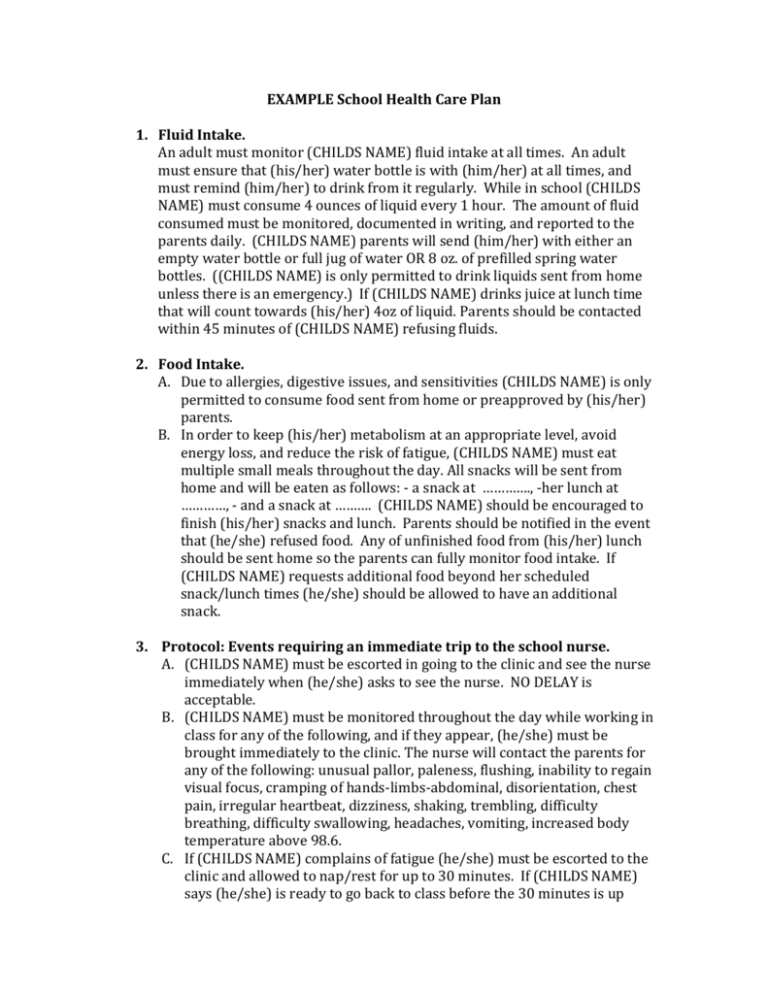
EXAMPLE School Health Care Plan 1. Fluid Intake. An adult must monitor (CHILDS NAME) fluid intake at all times. An adult must ensure that (his/her) water bottle is with (him/her) at all times, and must remind (him/her) to drink from it regularly. While in school (CHILDS NAME) must consume 4 ounces of liquid every 1 hour. The amount of fluid consumed must be monitored, documented in writing, and reported to the parents daily. (CHILDS NAME) parents will send (him/her) with either an empty water bottle or full jug of water OR 8 oz. of prefilled spring water bottles. ((CHILDS NAME) is only permitted to drink liquids sent from home unless there is an emergency.) If (CHILDS NAME) drinks juice at lunch time that will count towards (his/her) 4oz of liquid. Parents should be contacted within 45 minutes of (CHILDS NAME) refusing fluids. 2. Food Intake. A. Due to allergies, digestive issues, and sensitivities (CHILDS NAME) is only permitted to consume food sent from home or preapproved by (his/her) parents. B. In order to keep (his/her) metabolism at an appropriate level, avoid energy loss, and reduce the risk of fatigue, (CHILDS NAME) must eat multiple small meals throughout the day. All snacks will be sent from home and will be eaten as follows: - a snack at …………., -her lunch at …………, - and a snack at ………. (CHILDS NAME) should be encouraged to finish (his/her) snacks and lunch. Parents should be notified in the event that (he/she) refused food. Any of unfinished food from (his/her) lunch should be sent home so the parents can fully monitor food intake. If (CHILDS NAME) requests additional food beyond her scheduled snack/lunch times (he/she) should be allowed to have an additional snack. 3. Protocol: Events requiring an immediate trip to the school nurse. A. (CHILDS NAME) must be escorted in going to the clinic and see the nurse immediately when (he/she) asks to see the nurse. NO DELAY is acceptable. B. (CHILDS NAME) must be monitored throughout the day while working in class for any of the following, and if they appear, (he/she) must be brought immediately to the clinic. The nurse will contact the parents for any of the following: unusual pallor, paleness, flushing, inability to regain visual focus, cramping of hands-limbs-abdominal, disorientation, chest pain, irregular heartbeat, dizziness, shaking, trembling, difficulty breathing, difficulty swallowing, headaches, vomiting, increased body temperature above 98.6. C. If (CHILDS NAME) complains of fatigue (he/she) must be escorted to the clinic and allowed to nap/rest for up to 30 minutes. If (CHILDS NAME) says (he/she) is ready to go back to class before the 30 minutes is up (he/she) should be allowed to do so. These rest periods should be documented and reported in writing to the parents. 4. Protocol: Seizures (CHILDS NAME) seizure protocol should include the standard seizure protocol. In addition any additional seizure symptoms such as staring spells, unresponsiveness for any short periods should be documented in writing and parents notified. 5. Staff Training. (CHILDS NAME) health status directly impacts (his/her) ability to perform in the educational setting. In order to keep (CHILDS NAME) safe and healthy while at school all staff will complete training/ review educational materials provided by (CHILDS NAME) medical team/parents prior to the first day of school. Information will be reviewed regarding (CHILDS NAME) specific needs in relation to (his/her) mitochondrial disease, bowel disease, autonomic dysfunction, and temperature dysregulation. This will include ANY staff that might be alone with (CHILDS NAME) during her school day. 6. Reduction in physical activity. A. (CHILDS NAME) requires a modified P.E program/reduction in time or change in activity depending on (his/her) daily symptoms. B. If (CHILDS NAME) should start to experience any symptoms during P.E time (his/her) activity should be stopped immediately and above nurse protocols should be followed if necessary. 7. Notification of infectious illnesses. Parents should be notified of any infectious illnesses in the classroom. 8. Transportation Plan. A. (CHILDS NAME) will only take an air-conditioned or heated bus to and from school. B. (CHILDS NAME) will require a bus monitor and all monitors & drivers will have training on campus specific to (CHILDS NAME) transportation/health care needs. C. (CHILDS NAME) will require prompting when it’s time to load/unload the bus. D. Monitors MUST make sure that (CHILDS NAME) is buckled in her seat belt properly. 9. Stress Reduction. (CHILDS NAME) experiences stress in connection with her effort to cope with the symptoms of her disease, and this stress can in turn cause further fatigue and potential progression in (his/her) disease. (He/She) should be assisted in reducing stress levels by providing the specific supports described above and by maintaining an encouraging attitude towards (him/her). As the above protocols, if not followed may have a negative effect to (his/her) education/health. Physician Signature Date
